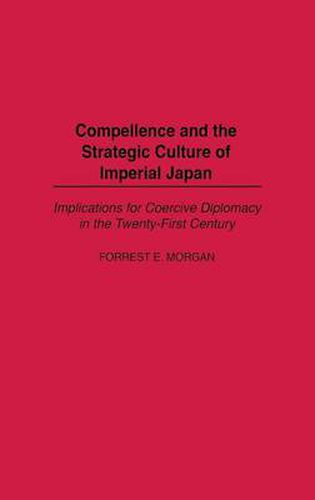Readings Newsletter
Become a Readings Member to make your shopping experience even easier.
Sign in or sign up for free!
You’re not far away from qualifying for FREE standard shipping within Australia
You’ve qualified for FREE standard shipping within Australia
The cart is loading…






Compellence is a fundamental tool of international security policy. This study explains how culture shapes the ways that decision-makers respond to the threat of force. First, Morgan builds a theoretical framework, next he analyzes three cases in which states attempted to compel Japan to change its behavior. The first is an in-depth analysis of the 1895 triple intervention in which Russia, Germany, and France forced Japanese leaders to return the Liaotung Peninsula to China following the first Sino-Japanese War. The second and third relate to World War II: the 1941 oil embargo intended to coerce Tokyo to withdraw its military from China and Washington’s 1945 efforts to force Japan to end the war. These cases explain much of the seemingly irrational behavior previously attributed to Japanese leaders.
Morgan demonstrates that culture clearly influenced outcomes in all three cases by conditioning Japanese perceptions, strategic preferences, and governmental processes. These findings are relevant today, and recent conflicts suggest that they will be increasingly important into the 21st century. This book offers policy makers a much-needed method for employing strategic culture analysis to develop more effective security strategies-strategies that will be of vital importance in an increasingly volatile world.
$9.00 standard shipping within Australia
FREE standard shipping within Australia for orders over $100.00
Express & International shipping calculated at checkout
Compellence is a fundamental tool of international security policy. This study explains how culture shapes the ways that decision-makers respond to the threat of force. First, Morgan builds a theoretical framework, next he analyzes three cases in which states attempted to compel Japan to change its behavior. The first is an in-depth analysis of the 1895 triple intervention in which Russia, Germany, and France forced Japanese leaders to return the Liaotung Peninsula to China following the first Sino-Japanese War. The second and third relate to World War II: the 1941 oil embargo intended to coerce Tokyo to withdraw its military from China and Washington’s 1945 efforts to force Japan to end the war. These cases explain much of the seemingly irrational behavior previously attributed to Japanese leaders.
Morgan demonstrates that culture clearly influenced outcomes in all three cases by conditioning Japanese perceptions, strategic preferences, and governmental processes. These findings are relevant today, and recent conflicts suggest that they will be increasingly important into the 21st century. This book offers policy makers a much-needed method for employing strategic culture analysis to develop more effective security strategies-strategies that will be of vital importance in an increasingly volatile world.